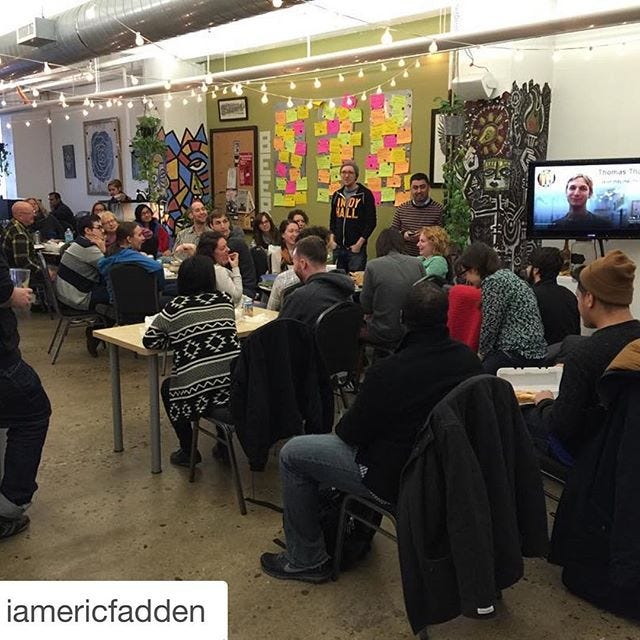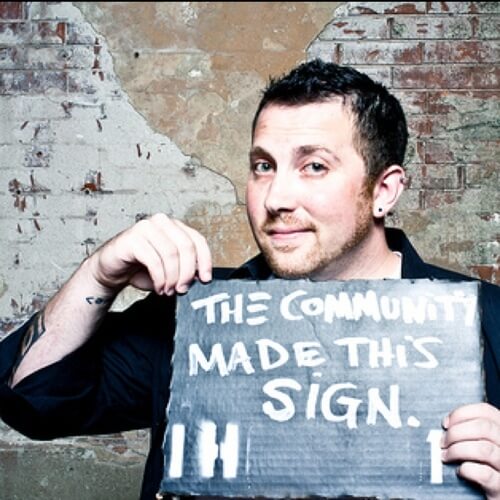This question shows up more and more in my channels, especially from community staff that have been hired and are essentially inheriting a challenge of turning a room full of still relatively disconnected people into a dynamic, interactive community.
On one hand, you’re telling prospective members about how great it is to join a community. But on the other hand, you can’t remember the last time YOU saw members really interact with each other. It might even make you feel a little bit dishonest about your offerings.
As lots of people learn – and often the hard way – it’s not enough to just say the word “community” 100 times a day. You can’t wish that people would interact more. You can’t force people to interact more.
But that doesn’t mean you can’t do anything!
There’s one fundamental that I think plays out across ALL community building exercises: create opportunities for people to talk and discover things about one another that they have in common.
Psychologist Carl Rogers said “that which is most personal, is most universal.”
In simple terms: get people in a place where they can share something personal about themselves and good things happen.
Here are a couple of things we’ve suggested for people who are trying to bootstrap a room of relative strangers into something that looks more like a community. And bonus, this stuff works for breathing new life into already vibrant communities, too! We use both fairly often to periodically rejuvenate Indy Hall.
1 – Everybody has to eat.
Depending on your community, breakfasts, lunches, and dinners might work better but finding a time when people were going to have a meal and inviting people to have that meal together.
During our member lunches, we often let people mingle and chat on their own for a little bit and then warm up the group by having everyone go around and say their name and something about themselves. We pick a prompt question like…“what’s something you recently started learning” or “what’s the best thing that happened to you in the last week” or “what’s your favorite spot in Philly that nobody seems to know about.” These questions give everyone a chance to share something small and simple, learn what they have in common, and there are ALWAYS conversations that extend beyond the lunch.

You don’t even HAVE to provide lunch, just a time and a place for people to bring theirs often is enough to get started. Down the road you can get fancy and try pot luck sharing…but I say down the road because that’s much easier once people are already in the mind/mood for sharing.
Sharing a meal is probably the simplest to execute, lowest barrier to entry, beginner community building event. Don’t be afraid to personally invite people one-on-one. They might say “no” but that doesn’t mean “no, not ever” it usually means “not this time, I’m busy!” or “no, that doesn’t sound especially interesting to me” (which is a clue that you need to figure out what WOULD be interesting to them).
Personal invites are super important – you might be worried about bothering people, but the alternative perspective is people saying “I didn’t know that was happening, why didn’t you tell me!?” 🙂
2 – Group Projects/Activities.
This move is a bit more advanced than a community meal, but works VERY well when executed properly.
There’s sooooo many ways to do it, too. Here’s a couple that have worked well:
-
You could find a local charity that is having a volunteer day, and rally some members to participate in volunteering together.
-
There might be something in the space that needs improving, and your members very likely have ideas for how to make it better. DIY projects are awesome for fixing problems in coworking spaces partly because they can save money but more importantly because they give people a sense of pride and ownership once they’ve played an active roll in making the space.
-
Is there a band or show coming to town that people would want to go to together? Or the opening of a new park, or museum, or other activity? Don’t feel like everything needs to happen in the space. My favorite “hack” is to ask members what stuff they do for fun (movies, music, books, food, sports, etc) and then ask “is any of that more fun when you’re doing it with others?” and when the answer is yes, suggest that they organize a group to do that within the community.
Again the goal with ALL of these ideas is not to get 100% participation in any of them…but to get even a small core group of 5-10 people to come together in a way that you can make visible to the rest of the community…which starts the snowball rolling downhill.
Repeat, repeat repeat!
This last part is SUPER important: the key to success, especially with an otherwise dormant community is, to do it more than once.
Lots of people try something once, maybe aren’t super impressed with the turnout (“it was just a couple of people!”), and decide not to ever do it again. Don’t act like it’s a failure, or else it will be one. In reality, if two people are there it’s a success.
Instead, follow through and next time you let people know there’s going to be a member lunch, talk about the great conversations you had last time to get people interested in the next one. Small successes add up to bigger successes over time, and in a community setting, growth really tends to pick up once you’ve created something contagious.
I really hope this helps lots of people. If you try any of these ideas (or modify them in some cool way) I’d love to hear about it in the comments!
 I am always thinking about the intersection of people, relationships, trust and business. I founded
I am always thinking about the intersection of people, relationships, trust and business. I founded